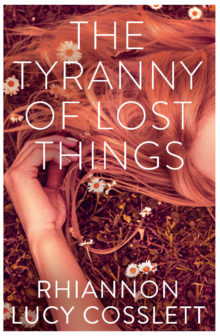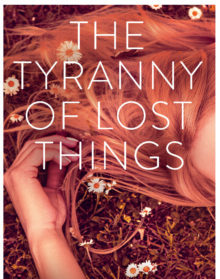
Carolyn Percy reviews a mysterious contemporary fiction novel by Rhiannon Lucy Cosslett called The Tyranny of Lost Things.
As a child, Harmony lived with her bohemian parents (and, later, just with her mother) in an urban commune in North London, until something happens the summer of her fifth year that culminates in them fleeing Longhope one night, never to return, never to be spoken of again. Fast forward to the summer of 2011. The house has been divided into flats and, having dropped out of university, Harmony returns, hoping to uncover the truth of what happened that summer and the source of her dreams of a red-haired woman who haunts the house. Will finding out finally end the feelings of dislocation she has had ever since, and allow her to start building her life?
In Welsh author Rhiannon Lucy Cosslett’s debut, the “tyranny of lost things” refers not only to physical objects but to the lost worlds of the past that these objects represent. The story is told through dual timelines: the first beginning in 1984 leading up to the event that forces Harmony and her mother to leave the commune for good, narrated by an unknown woman, a member of the commune whom Harmony’s parents both befriend; the second is set in 2011, during the summer of the London riots, and narrated by the now-adult Harmony.
Both periods are characterised by a sultry atmosphere that is conducive to and blurred at the edges by casual sex, drugs and copious amounts of booze, and this forms an important aspect of the novel. Harmony frequently remarks on the similarities between her and her parents’ hippie existence and the student/young-person-in-general-experience in modern London – the sex, drugs, drink and the (depending on how generous or cynical you are, either earnest or misplaced) sense of idealism – and through comparing the differences makes some astute observations about the generation gap and the state of modern society – comparing squatting to property guardians (landlords allowing tenants to live in empty properties for very little rent so that they don’t become occupied by squatters and therefore the value isn’t driven down) for example.
The mystery at the story’s centre – what drove Harmony and her mother to leave the commune permanently? Who is the red-haired woman who haunts Harmony’s dreams? Are they connected? – is an intriguing one and is presented well through the use of the braided narrative structure, planting clues in one timeline to be built upon in the other, thus driving the narrative forward.
Cosslett is also great at creating a character. Harmony in particular is an interesting and sympathetic protagonist: laid back on the surface, observant and doesn’t take herself too seriously, but with a vulnerability beneath. Her peripatetic childhood, a result of her mother splitting from her father and the constant upheaval from never staying in one place for too long after they leave the commune for the final time, has left her with feelings of dislocation and rootlessness which have left her feeling unable to move forward in life until the mysteries of the past are solved (this need for stability also manifests in anxiety over lost objects).
Cosslett also manages to make the setting into a character itself, particularly London; some of the most beautiful passages are about the changing face of the city, not just describing and documenting those changes but evoking a poignant sense of nostalgia, briefly bringing to lifetimes, places and communities lost to the inexorable wave of change.
The Tyranny of Lost Things by Rhiannon Lucy Cosslett is available now from Sandstone Press.
Carolyn Percy is an avid contributor to Wales Arts Review.











